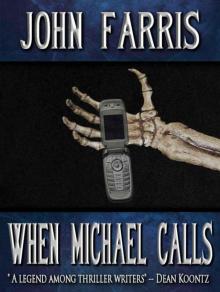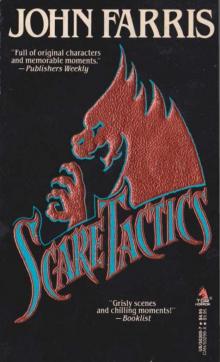- Home
- Farris, John
Captors Page 6
Captors Read online
Page 6
"They're taking damned good care of her," the General said again, kneading her shoulder with a hand well scarred by the beaks of the hunting birds he had trained. "They may have other schemes in mind for transferring that cash, but otherwise I know I've got them pegged. Now be a good girl and get some breakfast cooked. If you could use a tranquilizer I've got a few on me."
"No, thanks, I've taken two already. They're too seductive. I want to stand in one place all day braiding my hair."
She made coffee first so the General would have a cup, then put a frozen breakfast Danish in the oven to heat. She carried coffee to the FBI men in the library. When she returned the General was sitting at the table staring out at the first blaze of day on lawns and beds, on masses of peonies and rambling rose and late-blooming azaleas.
"Felice," he said abruptly, "you shouldn't let what's happened confuse your thinking about Sam."
"What do you mean, General?"
"You were all set to have Sam move out, let old Johnny Chesler draw up the papers."
Felice poured coffee for herself. She said, careful about her wording, "I had reached the point where—I didn't know what else I could do."
"You still hold out hope there might be a change in Sam?"
She was a long time in answering. "I believe we've been totally honest with each other. I believe he sincerely wants this marriage." The General sat hunched over his coffee. He looked at her, slow, sidewise, unblinking. He said nothing more. He had never understood how she could marry two men as fundamentally different as Sam and Doug Watterson. The General had loved Doug like a brother and still mourned him. Have you forgiven me, General, because I no longer mourn for Doug? He was the most exciting thing that ever happened to me, all that slapdash Texas charm, I was cockeyed in love with him. I lost him, and the world changed. I adapted and met Sam, whom I loved—do love, but in an altogether different way. Everyone adapts but you, General. You solidify."
And yet she had a measureable amount of affection for the old man; she put up with his obtuseness and maddening interference in her personal life. Her mother had been a happy flagellant, so Felice supposed that much of her mother, at least, lingered in her.
If Sam stayed, if they tried seriously to work out their differences, then inevitably there would be open warfare between Sam and the General. And, inevitably, she would side with her husband. The General would be badly hurt. But he alone was to blame.
Sam and Kevin came down to breakfast together. Unexpectedly the General was cordial, talkative. He explained his theories about the kidnappers while Felice served them. Sam just nodded, preoccupied, but the General's conviction was good for Kevin, bringing him out of his depression. He asked astute questions. The General knew him very well, she thought, watching the two of them with a trace of envy. Kevin's moods could be shattering. Last night he had blamed himself for what had happened to Carol. During questioning he had shouted at Gaffney, pounded up the stairs to his room in tears. Luckily he was growing up with men around the house. She loved Kevin too much, and understood him too little. Felice knew she never could have raised him by herself.
Before they finished eating, the telephone rang. Their reactions were predictable. Felice shut her eyes, not panicky, just dead certain she had forgotten how to breathe. Then without looking at anyone she walked the five steps to the wall telephone and answered. It was a buddy of Kevin's, about the cruise. Kevin made it as brief as he could, returned to the table unfocused and depressed again.
Sam said, "That's going to happen. People call. We can't be jumping five feet every time."
"I'd better let them know I can't go on the cruise," Kevin said. He had been counting on it for almost a year. Twelve boys from the yacht club in Rye were flying with chaperons to the Virgin Islands. The plan was to island-hop from Charlotte Amalie aboard a blue water sailer. The boys were divided into teams, and each team had chosen a navigational or scientific project to complete during the cruise.
"You're not going until next week," Sam pointed out. "Carol will be back long before then."
"She'll be back in this house tonight," the General vowed, for the tenth time. Kevin looked from one to the other and said nothing more; but there was trust in his eyes, and that made Felice uneasy. They were promising Kevin—promising themselves—far too much.
Gaffney came. He managed to be encouraging without having any hard news. Again the General expounded on his ideas, speculation having become God's truth to him by this time, and Gaffney listened intently, nodding, saying when the General had finished, "You've certainly given us some angles to think about, sir."
"The way I see it, you bug that case, sew a little transponder into the lining, and track him every step of the way. After they've released Carol, then you grab him."
Gaffney told Sam and Felice what they must do when the kidnappers called. "Demand to talk to Carol. Probably they won't let you, it wastes too much time, but demand anyway. Make the caller go slow on instructions; tell him you're writing everything down. Break down and cry a little if you think you can be convincing. Use up time."
He had brought with him an artist from the Bureau in Washington. After the table was cleared Kevin sat down with the artist and they went through a volume of transparencies called an Identi-Kit, putting together combinations of facial features until a reasonable likeness of the man Kevin had seen in Jake's emerged. It took a long time. The General stayed through a second cup of coffee and then went home to spend the morning on the telephone, placing and receiving calls from all over the world. Sam moved his papers and typewriter upstairs.
Felice washed dishes, collected laundry. A girl came on Tuesdays and Fridays to do the washing and cleaning. Felice thought of a plausible excuse to keep her away that week. Then she made brief calls canceling personal obligations through the week, exasperating old and dear friends by refusing to chat. By ten o'clock she could no longer think of ways to keep herself busy.
The FBI artist had finished his charcoal portrait. Studying the elongated, partially masked face gave Felice some bad moments. She wished she hadn't asked to see the drawing. She had begun to believe the kidnapping could be understood as a business venture after all, conducted by men who were ruthless and coldly precise in their methods, but not necessarily evil. They would look upon Carol as merchandise to be exchanged in good condition for X number of dollars. An honorable transaction. But there was brutality in this man's face. If Carol caused the least bit of trouble, if she annoyed him, he could hurt her without hesitation or remorse.
"I'll try him without the shades and the fright wig," the artist said, turning to a fresh page. "Thanks, Kevin. You don't need to stick around."
Kevin got up from the table, eyes slightly squinched as if he had a headache. He went outside without a word, screen door banging behind him.
Fifteen minutes later Felice saw him from an upstairs window, standing motionless beside the pond, Riggs lying in the grass at his feet. On impulse she went downstairs and outside, past the two-room guest cottage where the Dowds lived, past the enclosed green-surfaced tennis court. She could feel the heat of the sun on her bare shoulders, heat rising moistly from the stubble of the cut field beyond the hedged lawn. There were cooling trees on the shore of the green pond, twin elms that had somehow escaped the blight. Ducks coasted in the domino of shade alongside the small boat dock. Riggs got up at her approach and stretched himself and tried to snatch a yellow butterfly with his teeth. Kevin merely looked around and then back again at the sweltering pond.
"It's like when I was ten," Kevin said, "and Tim Beckley walked out in front of that ready-mix truck. And we waited almost all night in the hospital in Mount Kisco, just waited."
"I remember. Then it turned out not to be as bad for Timmy as we thought." She stood beside him for a while, hands in the pockets of her shift. "None of this is going to be as bad as we think it is. Because we're plain scared now and it's easy to let our fears run over us."
"When do you think they'll call?
"
"Soon," Felice said. "It has to be soon."
Chapter Five
Wednesday, June 26
By the time she heard big Jim's footsteps on the stairs, Carol had put together nearly half of the elaborate jigsaw puzzle, which was a reproduction of one of Degas's studies of dancing girls.
"Lights out, Carol," Big Jun said.
Carol held a small butterfly-shaped section of the puzzle in the air, not taking her eyes from the chop-board on which she was working. She sat cross-legged on the floor, the metal chain three-quarters taut, like a high-tension line connecting her to the white bed. "Just this one piece," she begged.
"All right, dear. I'll wait." Big Jim sat in one of the white sling chairs and crossed his legs. He was smoking, and he'd brought an ashtray, which he held in the palm of his right hand. Carol asked automatically for a cigarette. Big Jim balanced the glass ashtray on one bony knee and lit a cigarette for her, leaned over. Carol turned her head and he placed the cigarette between her lips. It was a menthol; she didn't care for those. She liked Handsome Dan's brand the best. Thinking of Handsome Dan activated the pinched lonesome feeling in her heart. He hadn't come to see her today.
She scowled at the puzzle, pretending to be in all kinds of difficulty. Actually she had seen where the piece would fit, but she wasn't ready for lights-out, and so she stalled.
Big Jim wore dark-gray Hush Puppies that were becoming shapeless from age. They were dusted all over with white, as if he had spilled talcum. But Carol knew what the white really was: marble dust. She'd listened to the chink-chink of chisel against stone most of the rainy afternoon.
"When can I see the bust?" she asked.
"Oh, it won't be ready for a long time, Carol."
"But you promised to show it to me first."
"I will," he said good-humoredly. He leaned forward again and gently plucked the piece of puzzle from her fingers. He notched it into the proper place on the board and sat back, looking down at her with a hint of amusement. He never really smiled, but most of the time he was in a relaxed, easygoing mood. He was nice-looking, except for a lack of hair and the unfortunate thickness and grape-stain color of his lips. His eyes were dark and attractive and his nose had a good, noble height of bridge. There was always a pale spot above his nose where he shaved a break between his eyebrows.
"Can I finish my cigarette?" she asked, getting up.
The chain made a noise sliding against the metal of the bed. Usually the chain didn't bother her; she seldom thought about it anymore. But for the last hour or so she had become increasingly aware of the chain as an impediment and a discrimination. No one else wore chains. It wasn't fair. If she didn't have the chain on she wouldn't have to stay Up all the time. She could go Down if she wanted to. Even Out. That was what she wanted more than anything. To be Out. If she were Out, then she could—
"What are you doing?" Big Jim asked, and Carol looked guiltily around at him. She flushed; there was disapproval in his eyes. Without realizing it, she had been tugging with one hand at the chain, hard enough to displace the bed a couple of inches. She stared at the marks on her fingers where she had gripped the chain so tightly.
Carol lowered her head as much as she could, still feeling guilty. "Nothing."
"Aren't you comfortable?"
"Yes, I'm comfortable," Carol said in a subdued voice, glancing at him, wishing he would forget about it. See, I'm not doing anything now. The ashtray was a heavy one. If she had it, she thought, she could knock him in the head, knock his brains out—
The emotion rather than the image confused and upset Carol: she was not accustomed to overpowering emotions. Why would she want to do something like that to Big Jim?
"You look nervous tonight," Big Jim said, studying her through a haze of cigarette smoke, his eyes narrowed down. "Does working on the puzzle make you nervous?"
"No, I like working on the puzzle," Carol said. She felt desperate to change the subject. The ash on her cigarette was nearly an inch long; she reached out and Big Jim held the ashtray for her. "Somebody came today—somebody else, I mean. It wasn't Handsome Dan."
"You have very good ears," he said, looking benign again. "No, it wasn't Handsome Dan."
"Was it somebody I know?"
Big Jim shook his head. "One more drag on that cigarette, and then into bed."
"I didn't hear Gorgeous Gertie singing today."
"I'm afraid Gorgeous Gertie has come down with a cold."
"Oh, that must have been her coughing."
"Right you are." Big Jim snubbed his own cigarette and came up out of the chair. He was eight inches taller than Carol. When he looked down at her she could see the light reflecting on the big bald spot toward the back of his skull. Deftly he pinched the cigarette from between her fingers and deposited it in the ashtray. Then he put his hand at the back of her blonde head, cupping it. He had hard, warty hands, nails mangled. She didn't like for Big Jim to stand this close, to touch her—it reminded her, dimly, of something shocking that had happened on a hot blue day, it reminded her of Big Jim transformed by a crispy mass of red hair and evil-looking sunglasses, his lips pursed in concentration as he—
Knock his brains out, and—of course, of course—RUN!
Run, she thought, licking her lips, staring helplessly at Big Jim. But that was foolish, where would she go? She liked it here.
"I like it here," she said, appeasingly, as if he'd questioned her.
"That's fine, dear. But you are edgy tonight. Naow, ah suspect it's on account of because you din drink yore tea at suppertime."
Usually it tickled Carol when he faked a drawl that way, she couldn't help giggling at his silliness, but this time she didn't respond at all, because in kidding tones he was accusing her of something quite serious. It was important for her to drink her tea at every meal, drink every drop. It was the one thing they all insisted upon.
But she just hadn't wanted it, that's all. She was bored with tea. So she had poured the whole cupful into the toilet.
Somehow Big Jim seemed to know what she had done, and, obediently, she was about to tell him, so he would quit watching her with those dark, fitfully amused eyes and pursed sausage lips, tell him so he would turn out the light and leave her. But something unexpected occurred: a coldness crept into her heart, a cold resolve to lie. It was very, very difficult to tell Big Jim any sort of lie. By concentrating on this coldness and an exhilarating sense of purpose, however, she was able to say it.
"Yes, I drank my tea."
"Hmm," he said, still watching closely. And then he believed her, and she felt a tiny jolt of triumph. "I guess Ba—I mean Gorgeous Gertie slipped up. No harm done." He reached into his shirt pocket and withdrew a plastic bottle half filled with red-and-white capsules. He shook two out. "Be a good girl and take these for me before you go to bed."
"All right," she said, because she was supposed to say it; but it was another lie.
But Big Jim wasn't going to leave it up to her. He went into the bathroom and filled the plastic tumbler with water and brought it to Carol. He stood beside her while she swallowed both capsules.
Carol put the tumbler on the table beside her bed and curled up on the bed, nestling her face against the pillow. "Good night, Big Jim."
"Good night, Carol. Gorgeous Gertie tells me we'll have pancakes in the morning."
"I want mine with maple syrup."
"You shall certainly have it." He turned out the light and Carol watched over one shoulder as he went down the steep stairs and through the curtain that shut out the light from below. For a few moments it seemed totally dark in the room. The pillow was cool against her cheek. Carol yawned. Most nights all she had to do was lie down and pow, just like that it was morning, and the breakfast tray was on the way up. She never remembered sleeping at all.
The alarm was a subtle one, no more than a skipped heartbeat and a shifting in the currents of her blood. She sat up, the bed creaking, the chain rattling against one hollow post. She did not
want to take the capsules. She did not want to sleep, because there were things to think about, things that troubled her.
A long time ago there had been a dog, a tawny shepherd named—Carol tried hard to think of his name, but it eluded her. She yawned again and lay back. Her mind was fogging slightly. . . . And the shepherd had roamed happily and confidently all over the neighborhood. But sometimes he made a nuisance of himself or accidentally frightened children, so it became necessary to chain him to a post in the back yard. The chain had made him miserable. He howled and leaped and tried to slip his collar, but, although he fought and bit at the chain until he lay exhausted with froth on his lips and mad yellow lights in his eyes, he could not be free.
Then one night he dug at the foundations of the post, dug deep around the concrete and with implausible strength and determination simply pulled the iron post over. She had watched from her bedroom window as he dug silently and tenaciously through the moonlit hours. She watched him run free with mingled feelings of loss and relief: it had not been right. He had run and run, and they never saw him again. It was not right to chain dogs, or people. It was wrong for her to be chained.
Carol sat up on the bed, which squeaked a little. Her throat was dry. There were funny lights before her eyes, sparkling, slowly exploding, receding trickily, confusing her, distorting perspective. She walked awkwardly, one hand paying out chain to keep it from rattling. She felt as if she were inching along a tilted surface, and her knees bumped together. Her heart fluttered and her head was filled with lemony air. She missed the bathroom door space and bumped the jamb hard, hurting her nose.
There was a bathroom light, but she didn't turn it on. Her breath stirred in her chest like dried leaves. She groped and found the john, lifted the lid. With a foot she pushed the door behind her until it was wedged against the length of chain. Then she braced herself with one hand and leaned over the john and stuck two fingers of the other hand down her throat.

 Sacrifice
Sacrifice Wildwood
Wildwood Fury
Fury Captors
Captors When Michael Calls
When Michael Calls Fury and the Power
Fury and the Power Dragonfly
Dragonfly Scare Tactics
Scare Tactics